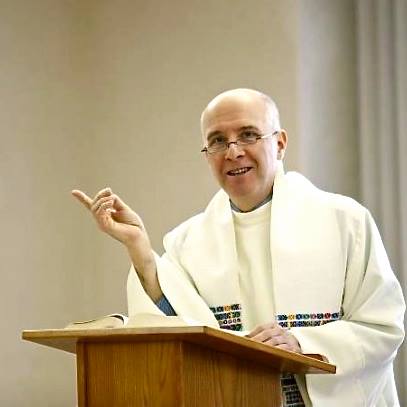Bruce Morrill, S.J. on Monika K. Hellwig, John Paul II and Christian rites of reconcilation
"It's forgiveness."
Two friends find themselves embroiled in the midst of a feud. They compare which of the devious acts caused by their significant others is worse: one cheats on his wife, the other leaves the bride at the wedding site on the day of the event. The two friends feel no fault-bearing of their own; in their minds and hearts, the significant others bear the entire cause and effect of grievous error.
As a result of the dialogue between the two friends caught in the fraught of a heated argument, one of the friends begins to take some time to reflect on her own level of responsibility for her actions that led to the demise of her relationship with her partner. In a terse conversation, she confronts her friend with some difficult but honest truths that cause her friend to initially push back.
"How can you expect things to go back to the way they were after what he did?"
"It's forgiveness. Whatever else you call it, it's forgiveness."
The two friends reconcile after several heartfelt talks that lead both friends to a reconcile with with their partners through some pretty heavy duty soul searching, honest and receptive dialogue in counseling and candid conversations with a community of friends. In the end, affection and trust provide a doorway for the light of truth that elucidates and forgives human flaws and deepends relationships.
 Bruce Morrill, S.J.
Bruce Morrill, S.J.
A new way, a new day
In an article generously given as a free PDF by Sage Journals, Bruce T. Morrill S.J. of Vanderbilt University offers Sign of Reconciliation and Conversion? Differing Views of Power—Ecclesial, Sacramental, Anthropological—among Hierarchy and Laity, (read the abstract here). Morrill's article provides several valuable perspectives and helpful alternatives to the practice of the rites of reconciliation within the Sacrament of Penance, which offers a means to a change of ways when hearts grow too hurt, situations grows too wearisome and people become utterly exhausted from wearing the yolk of anger.
While Morrill concludes that his article "is no naïve panacea for the significant difficulties penance and pastoral-liturgical ministry that we face" in this time and place in our Christian history, the suggested alternative practices shed light on practical and necessary strategies that stay true to Christian tradition and what Vatican II envisioned in the revision and expanded forms of the Sacrament of Penance as the church moves forward to find the embrace of an merciful God who waits with love and a burning desire to heal a conflicted world.
Comments welcome.
 Denise Morency Gannon
Denise Morency Gannon
Reader Comments